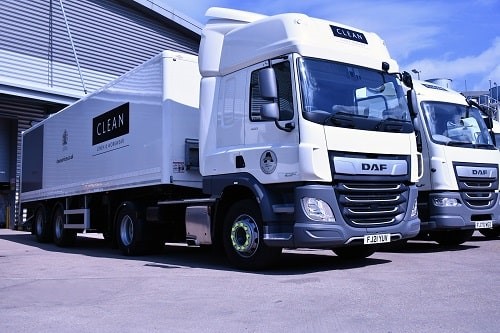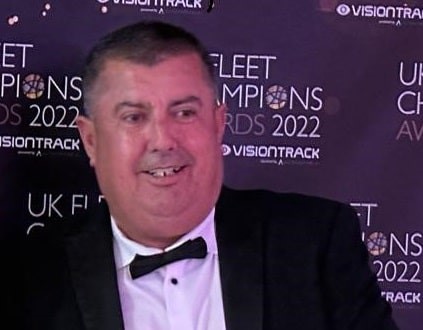Safety & Health Excellence Awards this year had a brand-new category: Best Driver Risk Management Performance. It was sponsored by National Highways, through its Driving for Better Business programme.
Features
Case studies: how excellent management of occupational road risk pays dividends
Why National Highways stepped in to create this award
Driving for work is one of the highest-risk activities that many employees undertake, whether they drive a commercial vehicle, a company car or make occasional work journeys in their own vehicle. As the gig economy continues to grow, this also means those who ride for work as well as those who drive.
Through this award, National Highways wanted to recognise employers who have taken a proactive, comprehensive and consistent approach to the management of their work-related road risk. Safer drivers are involved in fewer incidents, cause less damage, less wear and tear on company vehicles and use less fuel, which is currently a critical issue for many organisations. As well as a significant reduction in on-road incidents, award submissions had to demonstrate a range of other business benefits such as reductions in fleet insurance costs, maintenance costs, fuel spend and emissions.
 CLEAN runs over 100 commercial vehicles – from 3.5 tonnes to articulated HGVs. Photograph: CLEAN Linen Services
CLEAN runs over 100 commercial vehicles – from 3.5 tonnes to articulated HGVs. Photograph: CLEAN Linen Services
Road Safety is National Highways’ top priority: the organisation is committed to reducing harm on the network.
Heineken UK scooped the award. The drinks brand – with top names such as Birra Moretti, Bulmers, Amstel and Red Stripe among others – has 350 leased passenger cars used by remote sales employees to carry out customer visits throughout the country, each typically covering around 18,000 miles.
The company introduced a new online driver risk management tool which increased compliance from 58 per cent to 97 per cent. Good practice policies and procedures, along with a comprehensive ‘glove box guide’ issued to all drivers contributed to a reduction of 23 per cent in speeding offences and a seven per cent reduction in collisions over the year, despite overall mileage increasing by 177 per cent as business levels returned to normal after the Covid lockdowns.
The business benefits have been equally impressive with an eight per cent reduction in fleet insurance premiums and a 25 per cent reduction in end-of-term vehicle damage costs from the leasing company – all of which contributed to a total reduction in annual fleet operating costs of almost £500,000.
Reka Nagy, workspace and safety partner at Heineken UK, said: “Everyone has the right to safety regardless of their workplace or the task they undertake. Driving at work poses a high risk for our field base colleagues. Day-in and day-out, an almost ‘routine task’ can change the life of many and therefore we need to go beyond simple compliance to protect our colleagues and those around them. We strive for continuous improvement through driver behaviour programs, driver engagement and user-friendly solutions so we can create a safe place to be.”
 Reka Nagy: "Day-in and day-out, an almost ‘routine task’ can change the life of many and therefore we need to go beyond simple compliance."
Reka Nagy: "Day-in and day-out, an almost ‘routine task’ can change the life of many and therefore we need to go beyond simple compliance."
As a member of the judging panel, National Highways and Driving for Better Business were impressed by Heineken’s clear focus on driver safety and the commitment from senior management. National Highways wants to broaden awareness of the importance of managing work-related road risk with employers, and specifically health and safety professionals.
Driving for work not only represents one of the highest-risk activities that most employees undertake but is also a significant cost to the business. National Highways’ Driving for Better Business programme, which is entirely free to access, shares many examples of good practice along with a library of free resources to help employers gain peace of mind that they are legally compliant, are regarded as better places to work, and perform at a higher level of efficiency than those that don’t.
CLEAN Linen Services is highly commended on road safety
In addition, CLEAN Linen Services caught the eye of the judges, which awarded it Highly Commended.
CLEAN Linen & Workwear is part of Alsco, a multinational laundry specialist with a presence in 14 countries. It rents clean linen and workwear to hotels, restaurants, and other venues, collecting the used dirty textiles and leaving fresh product in its place.
In its award submission, Daniel Lee, transport safety and training manager, CLEAN Linen & Workwear, said: “We want drivers to be as safe as possible from the moment they join and throughout their careers with us. You can never predict what’s going to happen out on the road because there are so many factors. For us, it’s about trying to reduce the risk we can control, and to have drivers with as low a risk-rating as possible, in order to make them safer.”
The operation
CLEAN runs over 100 commercial vehicles – from 3.5 tonnes to articulated HGVs. Most are rigid vehicles working in urban centres, and the company employs 205 drivers. Hotel linen is high volume and dispatched in cages on large vehicles, while the lighter workwear goes out on the 3.5 tonne vehicles.
Setting drivers up for success
All customer delivery points are inspected and risk assessed at the beginning of the contract. Every driver has a route book, detailing the exact route, appropriate parking and cage placement. Parking, especially in London, can be difficult, so CLEAN equips drivers with the most up-to-date information, preventing the stress and distraction of being lost, confused or unable to park.
Driver risk
CLEAN works to reduce drivers’ individual risk profiles, carrying out a four-part risk profile with new employees, plus ongoing training, e-learning modules, support, toolbox talks and safety campaigns. The risk assessment is retaken annually.
A recent safety campaign was GOAL – Get Out And Look to address low speed manoeuvring collisions. Although vehicles have 360-degree cameras, drivers are encouraged to get out, checking around the vehicle before moving.
Telematics and cameras
The company uses Verilocation telematics and has cameras on all sides of vehicles. It uses tracking to note the driver’s proximity to a customer site.
CLEAN does not put its drivers under time pressure. “If they are late for a delivery, then so be it,” says Daniel. “Sometimes that is unavoidable and we have a customer services department to deal with it. We trust them to get there safely, and we do not contact them when they are driving.
“Our drivers do not even have access to Bluetooth while driving. If a colleague urgently needs to speak to drivers, they wait until the telematics shows them to be parked at a customer site.”
Driver engagement
Driver buy-in is critical to success: the transport teams share the fleet team’s aims, goals and strategies with drivers. “We explain our reasoning and see our goals as shared targets,” says Daniel. “Drivers accept the strategies because they know that what we’re doing is in their best interests. Their safety is paramount.”
Daniel says monetary savings “are purely a by-product for us. The aim is always safety.”
Collision investigation
CLEAN outsources collision investigations to an independent collision investigation company. This gives an independent, unbiased and expert approach. “This gives us consistency across all depots, useful recommendations and a comprehensive report,” says Daniel. “It’s very powerful. As we can see live trends in terms of collisions and near misses and are able to take a proactive approach in ensuring we take appropriate action to ensure the risk of collisions is reduced to as low as reasonably practicable.”
In time the aim is to have a trained in-house investigator who will be independent of any specific driver location.
TES 2000 – successfully managing driver safety
TES 2000 is a railway infrastructure and construction company, undertaking a range of services for Network Rail such as track renewal and maintenance.
 Mick Kiely: "I’m relentless in educating employees and directors about their responsibilities."
Mick Kiely: "I’m relentless in educating employees and directors about their responsibilities."
The company runs 140 LCVs, mostly two-seater vans. In April 2020, Mick Kiely became the first professional fleet manager the company had ever had. He explains what’s behind his mission.
“Twelve years ago, a friend of mine was killed in a non-fault road traffic collision while he was driving home. I arrived at the scene to witness my colleague’s lifeless body in the driver’s seat. That opened my eyes and I stepped aside from my job and went into fleet management. I’m relentless in educating employees and directors about their responsibilities. I never want to have to knock on someone’s door and offer my condolences due to a road traffic collision.”
When Kiely took over management of TES 2000’s fleet, he studied the company’s fleet insurance and incident reports and realised he needed to take drastic action. Apart from a handful of flatbeds and crew cab vehicles, the rest of the fleet are LCVs (light commercial vehicles) which are used purely for employee transport to sites.
Drivers routinely used the company vehicles for personal journeys. Mick banned this and instituted a policy of only clients and company employees being allowed in company vehicles. He emphasised to his drivers that they were not insured to carry family members and should not run personal errands in them. This was a drastic but necessary change as most drivers used the vehicles in lieu of a family car. In the first six months of this policy being enforced, it created enormous fuel benefits. Drivers who had covered 25,000 miles in 2019 now only did 12,000 miles a year.
There is a direct correlation between mileage and risk exposure. By more than halving the fleet mileage, Mick reduced incidents and risk.
There was some resistance to the safety changes because previously drivers had had little management. However, he gave drivers no choice except to follow company policy or surrender their right to drive a company vehicle.
Mick Kiely drove down incident rates and substantially reduced the company’s fleet costs.
- Penalty charge notices reduced by 96 per cent
- Insurance costs reduced by 35 per cent per vehicle
- A 45 per cent reduction in collisions in 16 months
- A 20 per cent reduction in fuel costs in two years despite price increases.
FM Conway achieves insurance saving
FM Conway is a UK-based civil engineering contractor specialising in highways and other infrastructure work. Upon achieving ISO 39001 certification (the international management system standard setting out the key policies and actions an organisation should take to reduce death and serious injuries related to road traffic crashes which it can influence), the company received a 10 per cent insurance premium reduction, saving £56,000.
This reduction continued, year-on-year, representing savings of approximately £350,000 since the system was introduced. The system has now been in place for 10 years and savings are evident on many levels.
For more case studies see: drivingforbetterbusiness.com
Read more about managing driver risk in this article by Simon Turner, campaign manager at Driving for Better Business here
FEATURES

Sedentary working and how to combat the ‘sitting disease’
By Gavin Bradley, Active Working on 05 April 2024
Prolonged and excessive sitting poses a major risk to our health, but the Get Britain Standing campaign and On Your Feet Britain Day on 25 April are a great way of encouraging workers to sit less and move more.

Company culture and wellbeing: a crucial link
By Bex Moorhouse, Invigorate Spaces on 05 April 2024
Investing in measures to support worker wellbeing will be ineffective unless the company culture genuinely incorporates values like teamwork, involvement, flexibility and innovation.

Office design and culture: happier and healthier staff – or the opposite?
By Guy Osmond, Osmond Ergonomics on 03 April 2024
Applying ergonomic principles to workstation set-ups and ensuring the physical environment supports neurodivergent people are just some of the ways of creating an office where everyone can thrive, but a supportive and positive organisational culture is vital too.


